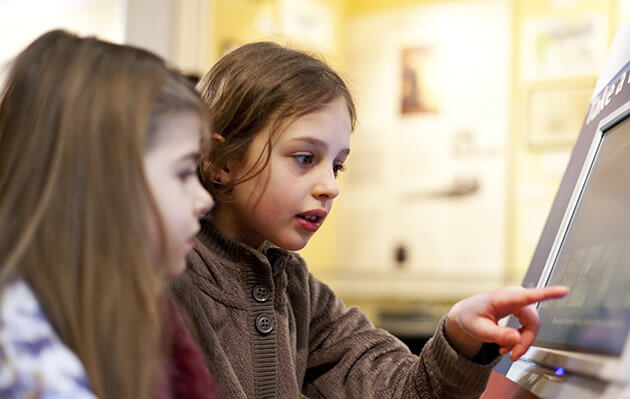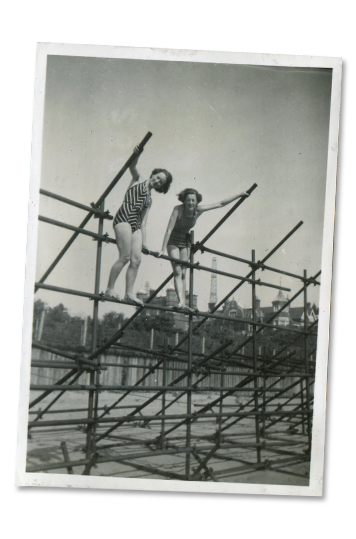Bawdsey Radar is part of world history and rich with opportunities for learning. Our aim is to make every visit as informative and worthwhile as possible.
Please contact us via i[email protected] to find out more.
Educational Visits
We’d be delighted to help you arrange a visit for your school or group. We’ll do our best to plan your visit to suit any special requirements and to schedule a time and date that suits you.

There will be a small charge, agreed with you in advance, for group visits, to help us prepare suitable material for the time that you’re here.
Please contact us via [email protected] to find out more.
Learning Resources
![]() These A4 PDFs have been designed specifically to be easy to download and print.
These A4 PDFs have been designed specifically to be easy to download and print.
Overview
Personal stories
- Hilda Pearson, Radio Operator 1944
- David Harrison – working on the East Coast Chain Home Tower – 1953
- Terry Bunce – RAF 1958-1984, three postings to Bawdsey – 1963
- Stanley Brown – Bawdsey Filter School – 1943
- Patrick Lyford – National Service at Bawdsey – 1953
- Sir Robert Cockburn – Memorial Address for Sir Robert Watson-Watt at the Royal Air Force Church of St Clement Danes – 1974.
- Keith Wood – Airborne radar development – 1935
- John Moss – National Service at Bawdsey – 1951
- Bill Walker – sports day at Bawdsey – 1943
- Douglas Myhill – Laboratory Assistant, Bawdsey – 1938

Bawdsey Radar Talks
Does your organisation, club or society arrange talks for your members?
If you are based in Suffolk or nearby then Bawdsey Radar offer a number of different live talks covering the history of radar and its link to events in World War 2. The talks are not technical but focus on the story and the people involved. As we are a Charity we do look for a donation towards the running of the Trust. If you are interested then please contact Graham Murchie at [email protected] in the first instance.
‘The Eyes of the Few’
The talk covers a brief history of early radar, the events leading up to the development of a viable system and the establishment of the world’s first operational radar station at Bawdsey. It focuses on the people involved with a fairly brief mention of the technology. It concludes with a short summary of how Bawdsey was used during and post-WWII.
‘Secrets and Spies’ (How Nazi Spies Lost The Battle of Britain)
With increasing interest in the history of World War 2, so many intriguing stories are coming to light now. One is how Nazi Germany’s spies failed to discover any worthwhile information about our radar systems – even sending a Zeppelin airship to travel up and down the east coast just four weeks before war was declared to try and find out what the large steel transmitter masts were doing. The talk is a fascinating insight into spies and spying and how so much effort was directed at the radar stations which played such a vital role in the Battle of Britain.
‘D Day Deceptions’
The D-Day landings of 6th June 1944 marked the beginning of Operation Overlord and the battle to liberate occupied Europe. The Allies needed to deceive the German forces about where and when they intended to land 160,000 men, with the aid of 8,000 ships and 11,000 aircraft. All those ships and planes were visible on German radar, so how could we get as many of those troops as possible safely ashore and delay the inevitable counter-attack? The talk is a fascinating insight into the many layers of deception that helped to protect the huge Allied invasion forces as they approached the coast of France and then fought their way inland.
‘Radar and the Battle of the Atlantic’
Ground based radar was developed in the mid to late 1930s but more was needed. This talk covers the history of airborne radar covering both Air Interception and, more particularly, Air to Surface Vessel radar. It explains how radar was vital in detecting U Boats and, as a result, enabled the Allies to win the Battle of the Atlantic.
‘Tracing WWII Relatives’
Many families have stories or perhaps some old black-and-white photographs passed on from their relatives who were in the armed forces during World War 2. But how do you go about finding out more details after so many years have passed? In this talk you can discover how you can trace your family history from the wartime records and find out how to use the very many archives and sources of information that are available.

